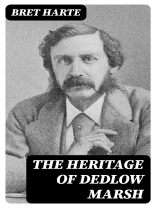In ‘The Heritage of Dedlow Marsh, ‘ Bret Harte crafts a vivid tapestry of life in 19th-century California, blending elements of humor and poignancy in a narrative rich with regionalism. The story centers around the titular Dedlow Marsh, a fictional landscape that serves as a microcosm for larger socio-cultural dynamics, revealing the complexities of the American frontier. Harte’s prose is characterized by sharp wit and an acute sense of place, drawing readers into a world where characters grapple with their ambitions and moral dilemmas amidst the tumult of the Gold Rush era, reflecting the transitional spirit of American society at the time. Bret Harte, an influential figure in American literature, was born in 1836 and spent his formative years in California, where the landscapes and social interactions inspired much of his work. His experiences as a teacher, editor, and writer in mining towns honed his ability to depict the diverse tapestry of American life, particularly the struggles and triumphs of individuals on the fringes of society. Harte’s keen observations of human nature and his deep connections to the American West profoundly influenced his storytelling. This book is a must-read for anyone interested in American literature, regional studies, or the complexities of human relationships in challenging environments. ‘The Heritage of Dedlow Marsh’ not only provides an entertaining narrative but also offers valuable insights into the moral and social undercurrents of its time, making it a rich resource for scholars and casual readers alike.
About the author
Bret Harte (1836–1902) was an American short story writer and poet, best remembered for his tales of the American West during the Gold Rush era. His unique narrative style blended wit, a keen observation of frontier life, and a genuine empathy for his characters, setting the foundation for the Western genre. Harte’s work pivots around the prolific use of regionalism, capturing the colorful vernacular and the rugged landscape of early California. ‘The Heritage of Dedlow Marsh, ‘ one of his engaging narratives, exemplifies his skill in portraying complex characters bound by the peculiar moral codes of the West. Harte’s influence extended to nurturing other literary figures of his time, and his legacy endures through his contributions to American literary realism and the establishment of Western fictional motifs. Although he wrote numerous stories, his career was highlighted by works such as ‘The Luck of Roaring Camp’ (1868), ‘The Outcasts of Poker Flat’ (1869), and ‘M’liss’ (1873), each reflecting the dichotomy of roughness and sentiment that characterized Gold Rush society. Respected by his contemporaries, including Mark Twain with whom he collaborated on ‘The Celebrated Jumping Frog of Calaveras County, ‘ Harte’s seminal voice in American literature continues to resonate with readers and scholars alike.












